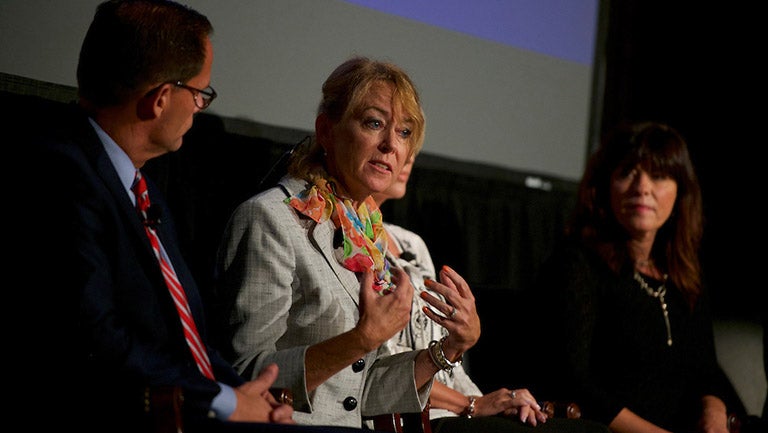Title: Justice Department, FBI, DEA Heads Speak at Opioid Addiction Event
U.S. Attorney General Loretta Lynch, FBI Director James Comey and DEA Acting Administrator Chuck Rosenberg speak at Georgetown as the university hosts a screening of the documentary Chasing the Dragon: The Life of an Opiate Addict.

Sept. 22, 2016 – Attorney General Loretta Lynch, FBI Director James Comey and Chuck Rosenberg, acting head of the Drug Enforcement Administration (DEA), spoke at Georgetown last night during a screening of the documentary Chasing the Dragon: The Life of an Opiate Addict.
The documentary, recently released by the FBI and DEA, is designed to educate students and young adults about the dangers of addiction.
She said earlier this month the U.S. Department of Health and Human Services reported that 3.8 million Americans ages 12 and up are currently misusing prescription pain relievers.

“The opioid epidemic is indifferent to race, class, age or geography. It cuts across our entire society,” Lynch said. “It affects young, old poor, rich, rural communities – some of the hardest hit – as well as our major cities. It’s a national problem, and that’s why we are crafting a national solution.”
The documentary showed the paths of individuals who became addicted to opioids in various ways and how it ruined some lives and ended others.
Georgetown’s Office of the President, the McCourt School of Public Policy and the School of Nursing & Health Studies sponsored the event.
“Take this, show it to someone you love, have that conversation,” Rosenberg said following the screening. “Don’t just leave here tonight and do nothing. This is an epidemic and we are losing way too many people to it.”
He said this year 47,000 people will die from drug abuse in America.
Comey said the FBI had teamed up with the DEA to, in addition to arresting distributors of drugs and taking corrupt doctors to task, “try and steergood people away from something that will swallow their lives. “
“There are people in this auditorium, people who participated in this film who have suffered grievous loss, people who have lost some of the most important immeasurablethings in their lives,” Comey said.

After his remarks, Comey joined Rosenberg for a discussion moderated by McCourt School of Public Policy Dean Edward Montgomery.
Montgomery also moderatedapanel with Georgetown opioid researcher Peggy Compton, associate dean for research, evaluation, and graduate studies at Georgetown’s School of Nursing & Health Studies, and individuals personally affected by opioid addiction.
When Montgomery asked Compton why pain medications are so addictive, she explained that there are “all kinds of drugs of abuse, including alcohol, which kind of ticklethe reward center and provide euphoria …”
“What happens neurobiologically is that after a while these rewarding feelings start to take over motivational systems in the brain,” said Compton, who has researched opioid addiction for many years. “So that as people were saying in the film, they don’t care about anything else, their only motivation was to get to the next fix.”
She said there are “very, very effective treatments for opioid addiction,” including medications that help people withdrawal from the opioids they are abusing and urged people suffering from addiction to seek help.